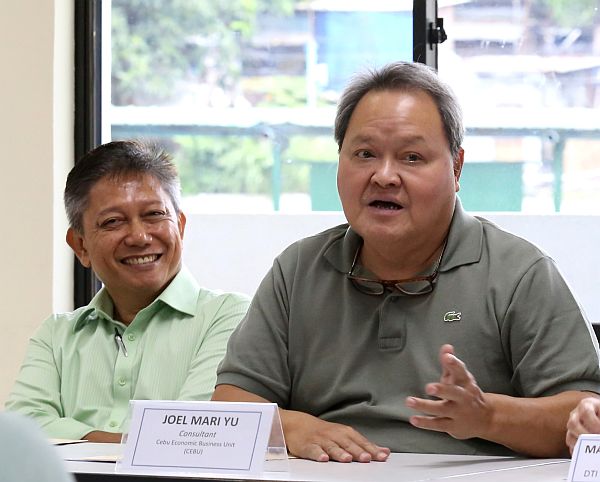
Wilfredo “Jun” Sa-a Jr., managing director of Cebu IT-BPM Organization (CIB.O), discusses digital transformation during Tuesday’s Slingshot Philippines Conference. Joel Mari Yu, Cebu City’s consultant on business and economic development, also shared his views on the issue.
CDN PHOTO/JUNJIE MENDOZA
Amid a changing business environment, a leader in the local information technology-business process management (IT-BPM) industry urged the public sector to make use of the digital platform for its services and processes.
Wilfredo “Jun” Sa-a, Jr., managing director at the Cebu IT-BPM Organization (CIB.O), said there are limited to no services offered by government offices made available online, adding that there is a need for the Philippines to catch up in terms of digital transformation.
“I experienced the impact of digital transformation two years ago when I was applying for an India visa. In 2015, I had asked a travel agency to facilitate the process, and it took three weeks before I got the document,” he said on Tuesday in a press briefing on the upcoming Slingshot Philippines Cebu Conference, an initiative of the Department of Trade and Industry (DTI) to improve the capacity of enterprises and startups through digital innovation.
Sa-a said that with the “Digital India” program, he received his Indian visa in less than 24 hours during a recent application.
With digitalization of government processes, the industry leader said things move very fast and people have more time to do other important things.
Consider going online
In a text message to Cebu Daily News on Wednesday, he said local government units (LGUs) as well as national government agencies like Social Security System (SSS), Pag-ibig, Philhealth and the Bureau of Internal Revenue (BIR) should seriously consider offering more online transactions.
“We can start with just applying online for getting your ID numbers for membership or TIN (tax identification number),” he said.
In the case of BIR, existing taxpayers can file their taxes online or through a mobile application, but new registrants are required to queue at the agency’s district offices to secure a TIN.
Internet availability
Sa-a said that one aspect to consider to achieve digitalization of government services is the availability of internet and its connection speed.
“Faster internet speeds mean faster online services, too. But even with a not so fast internet, at least we can expect that online services can be delivered within the day. This can be done anywhere as long as there is internet,” he said.
He added that productivity will be improved with these initiatives.
The government, through the Department of Information and Communication Technology (DICT), has been tapping telecommunication companies to provide free WiFi in public places, which could also happen in Cebu.
New role for Yu
The Cebu City government can lead the way in making the call of local governments go digital into a reality.
A scenario that can likely happen after businessman Joel Mari Yu accepted the position of Cebu City’s consultant on business and economic development, whose aim is to help hasten the digital transformation of business process in Cebu.
Yu also said that he would start the endeavour with City Hall.
Yu said the complaints of never-ending bureaucracy in government processes sealed his decision to take on the added responsibility.
He said he would seek the help of local startups and Cebu-based interest groups such as the Cebu IT-BPM Organization (CIB.O) to help him achieve his goal.
Yu cited the issuance of community tax certificate as the easiest to digitalize.
Issues
However, he said he would also discuss the matter to Cebu City Mayor Tomas Osmeña, who has some issues on digitalization of processes at City Hall such as the element of trust, which is usually involved in people-to-people transaction.
He also cited the possibility of people losing jobs when City Hall would go digital.